QuestionHi April,
I am trying to help my sister's betta who is extremely ill. She let the water get extremely dirty on several different occasions with the last being so dirty you could not see the two fish she had inside. After this event, my father and I took over the care of the fish. She initially kept two male bettas together in a smaller tank with a divider (upon research, I have since found the betta and small space myth). Shortly after the filthy tank was cleaned, we lost one fish, but the other other is alive and he is very ill. He will float on his side and upside down, only moving when you tap the tank. When you do, he will frantically flit around the tank, not stopping for anything in his path. He will not hardly eat at all. His right eye is red, it looks as if he might has rammed it into something. He will float with his body curved in half, then has troubles righting himself if you tap the tank or get too close. His gills are a dark red colour and he always seems to be gasping for air. His colour is dulling quite a bit, he used to be a deeper red colour, and now he is a dull red. Overall, he appears very sickly, including his fins which do not look very healthy. Given his overall health, his fins fit right in, however I am concerned in the event they are beginning to, or already are rotting. He is currently in a small 1/4 to 1/2 gal (rough guess) tank with an oxygenator. We feed him blood worms, usually once or twice a day, in smaller amounts.
This is the container he was initially held in with another betta. After we realized she had a problem in caring for the fish, we bought a 1 gallon aquarium with a small canister filter. We had the tank set up for a couple of weeks before we started noticing major changes in his behaviour. He has always been a very "quiet" fish. Even when he was first brought home he was not very active. I have not taken any readings on the water as we did not expect the fish to live. I have treated him a couple of times with Melafix. The major changes that caught our attention started around two weeks ago and have worsened since. My father and I have kept various types of fish for many years, and were almost 100% certain this fish was not going to live. And yet, he is, quite miraculously, still alive.
I'm hoping you might be able to help me in diagnosing this ailing fish's many problems and hopefully bring him back to health. With his many issues, I am concerned about treatment. I am afraid of overdosing the fish with too many medicines, or treating with the wrong ones.
Thank you in advance for any help you might be able to provide. It pains me to see him the way he is currently, I want to help him but don't know how. I really appreciate any time taken to read this email and help with the fish.
Thanks again,
Carolyn
AnswerHi Carolyn,
STOP THE MELAFIX NOW. Melafix can cause labyrinth fish, such as bettas, to die. It intereferes with their internal breathing organs, causing them to swell and the fish to die. I have not experienced this myself and have carefully treated bettas with Melafix with success but I do believe continuing to dose a labyrinth fish with Melafix will cause certain death.
The problem now is the tank. They don't make canister filters in that small of a size so I am assuming that what you have is actually an air pump for an undergravel filter. This is very different and not at all sufficient. Neither is the new tank size. Bettas require at least a 5 gallon tank for one with a filter and a stable 78-80 F temp. This is the only thing that will keep them healthy, happy and disease free the 5-7 years that they can live if adequately housed.
All new tanks go through a cycling process. This is when the beneficial bacteria accumulates in the water. This eats the harmful ammonia and nitrites that are produced from fish waste. Ammonia and nitrites are toxic and lethal to fish and until there is enough bacteria built up the fish suffers from the excess ammonia and nitrite in the water, which is probably what is happening to him now.
Also, do not tap on the glass. This scares fish to death and this is why he wildly darts about when you do it. This is only adding to his stress level. You can see if he's still breathing by looking at his gills for movement and eventually he will need to surface for air.
What you need to do at this point is to get him immediately into a 5 gallon tank with a heater and proper filtration. Walmart has a great 5 gallon hexagon shaped tank with a built in biowheel filter for $29. Buy a small heater, anything that will keep the water at a stable 78/80 F. This small of a heater will be cheap too. Instead of using disposable filter cartridges I would buy a small Hagen Biomax insert and a small Hagen sponge and use these. You never have to throw these away. When you clean the gravel and change the water at routine maintenance times you simply remove these, rinse them in water that came out of the tank and put them back in.
You will need to transfer any gravel, plants and filter media from the old tank to save as much of the beneficial bacteria that you have accumulated thus far to help the cycling process of the 5 gallon. Don't transfer the water if it had Melafix in it. Instead, use new tap water that has been double dosed in Seachem's Prime. Prime is a great conditioner and also eliminates some of the harmful effects the cycling process does to fish. DO NOT ADD the new water until it has been Primed first as the tap water will kill the beneficial bacteria that you have accumulated thus far. Add 1 tsp per 5 gallons of aquarium salt. This will help reduce stress. You can also try the recommended dose of API Stress Coat and Tetra's Easy Balance as well, these are great products and will help reduce stress.
You will need to change out 25% of the water at least 2-3 times per week, double dosing the Prime in the new water until you get a reading of 0 ammonia, 0 nitrite and 5-20 ppm nitrate. This will mean, once you get these readings, that you are finally cycled and can then go to routine maintenance schedules where you clean gravel and change out 25% of the water weekly.
I would treat him with a good round of Maracyn and Maracyn II. These are broad spectrum anti-bacterial anti-biotics that treat both gram-negative and gram-positive bacteria infections. Hold off on all foods while you treat him with the Maracyn (fish can go months before starving so he'll be fine). You should see a marked improvement within a week in his appearance and fins. If he still has issues after the Marcyn and Maracyn II it may be considered that he also has parasites but not much you've told me indicates this now, it sounds more bacterial to me.
Please let me know if anything changes.
Good luck : ) April M.

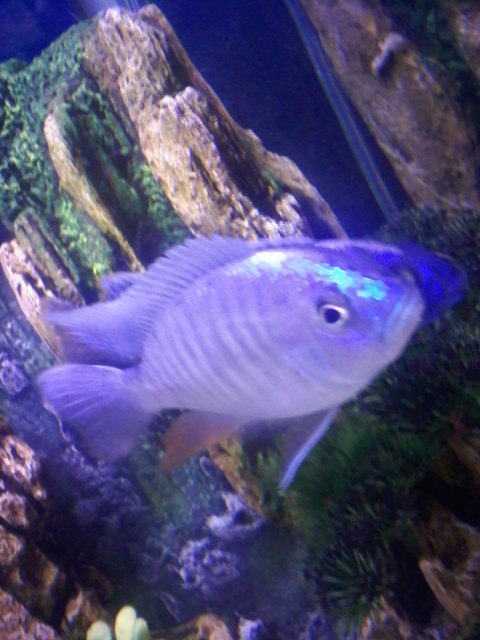 Ahli Cichlid
QuestionWhite Fish
QUESTION: Why is my Electric
Ahli Cichlid
QuestionWhite Fish
QUESTION: Why is my Electric
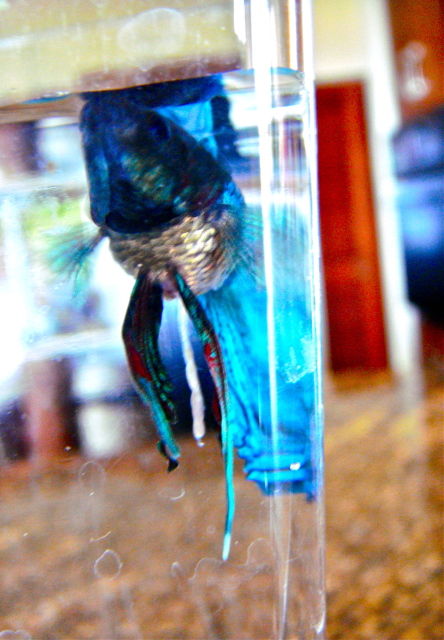 Sick Siamese Fighting Fish
Question
Hi. I have a male Siamese Fighting Fish
Sick Siamese Fighting Fish
Question
Hi. I have a male Siamese Fighting Fish
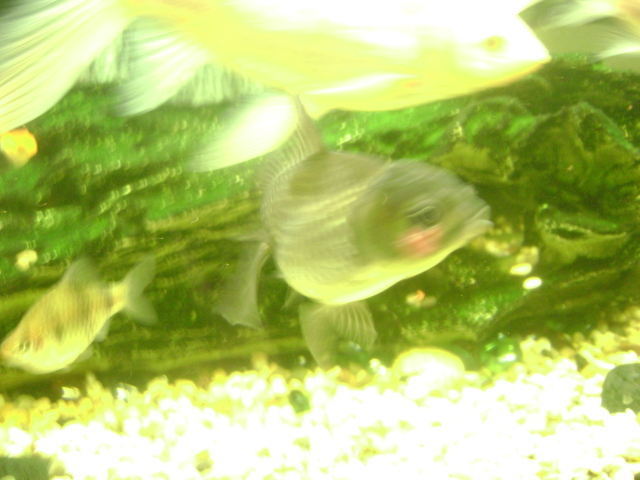 open wound below eye,no white fungus
Questionblue orando
QUESTION: heya,i have an ora
open wound below eye,no white fungus
Questionblue orando
QUESTION: heya,i have an ora
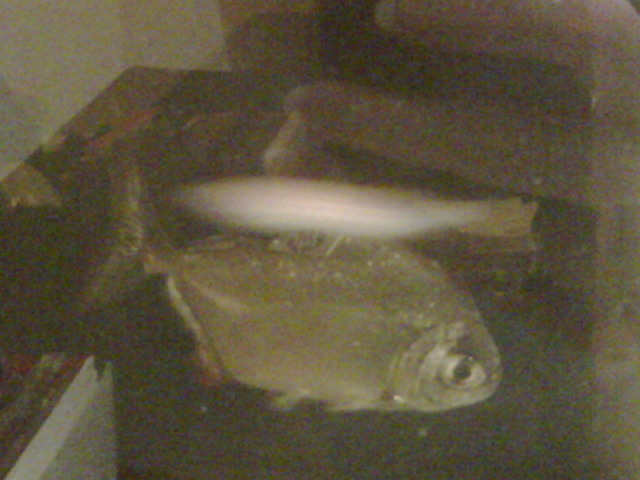 Ick?
QuestionQUESTION: Hi. I have one Silver Dollar fi
Ick?
QuestionQUESTION: Hi. I have one Silver Dollar fi
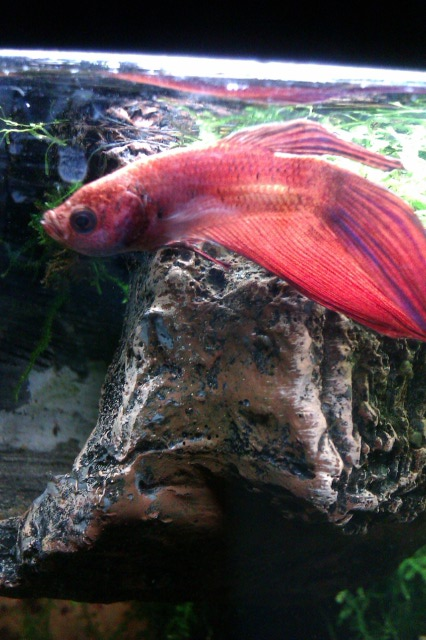 Betta Health Issues
Question
Close-up of betta whole body shot
Betta Health Issues
Question
Close-up of betta whole body shot